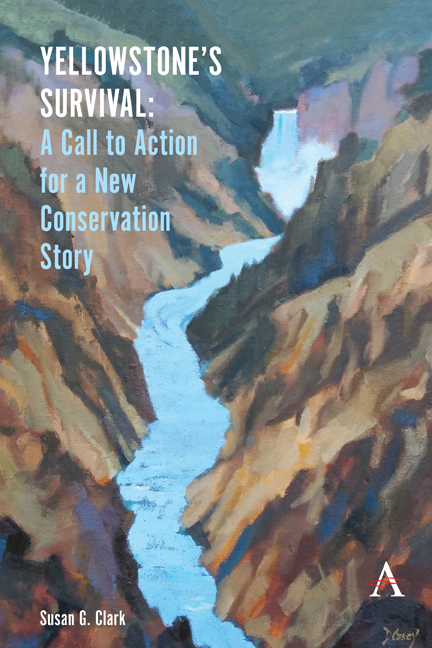 Yellowstone's Survival - A Call to Action for a New Conservation Story
Yellowstone's Survival - A Call to Action for a New Conservation Story Published online by Cambridge University Press: 22 May 2021
People, including our personal subjectivities and values and our shared culture and institutions, play a paramount role in all of the conflict and success in the GYE. The people level and our differing mental outlooks affect all that is Yellowstone, all the time. This overall subject is the most neglected dimension of Yellowstone's management policy. Currently, people are influencing GYE's present and future, guided by the stories they use to inform themselves. It is these stories about people and nature that are endless in variety and content. Our stories are about what we understand of the biophysical world we experience in the GYE. At the same time, our stories reflect who we see ourselves to be. People are at the very center of GYE's big story and what we make of it.
Consequently, we need to zero in on people, their psychology and meaning making, and simultaneously the larger societal context and policy processes that we are all part of. We need to do this, if we are to understand the GYE as conceived and conveyed through our individual and cultural stories and behavior, which are rooted in historical contexts. I want to zoom in on our individual and social selves, without losing perspective on the big, long-term perspective. How can knowledge and insights about our biology, psychology, and sociology help us make sense of current affairs and of the immediate challenges we face. Can philosophy help?
To get a realistic grip on people and their individual and collective actions requires that I bring in the humanities as well as social and integrative sciences in this part. Consequently, I draw on various disciplines that I have found helpful to understand the people dimension. My agenda here is somewhat global. I look at some of the major forces and factors that shape us as individuals and our societies all over the world. These are likely to influence the future of the GYE and the whole planet.
The three chapters in Part 2 look at what people do and why. We know that reality is composed of many threads. In this part, I try to cover different aspects of ourselves as people and society. I do not claim to be exhaustive.
To save this book to your Kindle, first ensure no-reply@cambridge.org is added to your Approved Personal Document E-mail List under your Personal Document Settings on the Manage Your Content and Devices page of your Amazon account. Then enter the ‘name’ part of your Kindle email address below. Find out more about saving to your Kindle.
Note you can select to save to either the @free.kindle.com or @kindle.com variations. ‘@free.kindle.com’ emails are free but can only be saved to your device when it is connected to wi-fi. ‘@kindle.com’ emails can be delivered even when you are not connected to wi-fi, but note that service fees apply.
Find out more about the Kindle Personal Document Service.
To save content items to your account, please confirm that you agree to abide by our usage policies. If this is the first time you use this feature, you will be asked to authorise Cambridge Core to connect with your account. Find out more about saving content to Dropbox.
To save content items to your account, please confirm that you agree to abide by our usage policies. If this is the first time you use this feature, you will be asked to authorise Cambridge Core to connect with your account. Find out more about saving content to Google Drive.